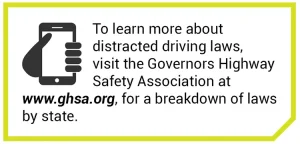
By Ralph G. Martinez, Esq. and Ed Rigsbee, CAE, CSP
If employees are punching in a telephone number or raising a cell phone to their ears while driving, their employers might be liable. A growing number of states in the US and several foreign countries are making it a crime to use a cell phone while driving unless one’s cell phone operates “hands-free” or is a “hands-free” device. Employees should know their company’s current, written policy on cell phone use while driving on the job.
Productivity and connectedness
Technological advances improve productivity and connectedness. Drivers across the US redeem some of their driving time each day by staying connected with parents, children and friends during their commute. Many also conduct business by telephone during these long commutes or travel times. In decades past, drivers would have to pull over to the side of the highway when they found a telephone booth or a pay telephone. This may return as the preferred way to stay connected en route, particularly for driving minors.
Technology may give us advantages, but they sometimes bring unexpected changes in our lifestyle. The law all over the world is responding to the increased number of accidents that involve drivers being distracted on cell phones. The law is merely catching up to the new risk introduced by new technology that has been embraced and exploited.
Higher potential liability for employers
 The protection of new safety laws also creates new risks for business owners and leaders. In most areas of the US, if employees violate a safety law while involved in a car accident on the job, they and their employer may be held negligent, even if they are otherwise driving well. Generally, the concept is referred to as negligence per se. Lawyers use the principle of negligence per se as a shortcut to establish liability in lawsuits to win damages for people injured in accidents. The new wave of cell phone laws are safety laws designed to eliminate distractions and prevent accidents. Depending on the extent of the injuries, this financial risk to an employer could be very substantial. If the cited employee driver has violated the cell phone law before, significant punitive damages could be assessed against the employer. Negligence per se as a principle will be used more frequently in personal injury cases when a driver was using a cell phone.
The protection of new safety laws also creates new risks for business owners and leaders. In most areas of the US, if employees violate a safety law while involved in a car accident on the job, they and their employer may be held negligent, even if they are otherwise driving well. Generally, the concept is referred to as negligence per se. Lawyers use the principle of negligence per se as a shortcut to establish liability in lawsuits to win damages for people injured in accidents. The new wave of cell phone laws are safety laws designed to eliminate distractions and prevent accidents. Depending on the extent of the injuries, this financial risk to an employer could be very substantial. If the cited employee driver has violated the cell phone law before, significant punitive damages could be assessed against the employer. Negligence per se as a principle will be used more frequently in personal injury cases when a driver was using a cell phone.
Employee handbook and written policy
Employers should adopt a written policy and/or amend the employee handbook to require strict compliance by employees with the hands-free cell phone law that is adopted by their country, state, city, county or township. Many businesses may instruct their employees not to use cell phones while driving and to let incoming calls go to voicemail, to be returned outside of the car in a safe area.
If a business issues cell phones to its employees, or necessarily requires the use of a cell phone by its employees, make sure that the cell phones can be used hands free. Note that a cell phone that has a speaker phone function will not necessarily comply with the law. Employers that hire employees under the age of 18 should prohibit their use of a cell phone in a car. The policy should be acknowledged by employees in writing and enforced by the company. An attorney can help businesses assess the specific risk and how to protect against that risk with an appropriate policy and implemented management practice. The authors have developed a policy and are helping many businesses protect against this new risk from this safety law. Adjusting to these developments not only will allow employees to drive more safely on the highways but also continue with their business efforts – in both cases, undistracted.
Ed Rigsbee is the founder and CEO of the 501(c)(3) non-profit public charity Cigar PEG Philanthropy through Fun and president at Rigsbee Research, which conducts qualitative member ROI research and consulting for associations and societies. He holds the Certified Association Executive (CAE) and Certified Speaking Professional (CSP) accreditation. Rigsbee is the author of the The ROI of Membership – Today’s Missing Link for Explosive Growth, PartnerShift, Developing Strategic Alliances and The Art of Partnering. Resources are available at www.rigsbee.com.

